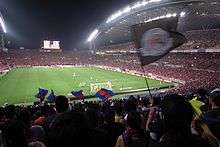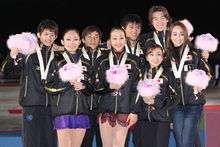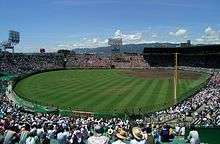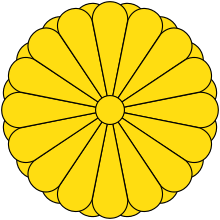Sport in Japan
| Part of a series on the |
| Culture of Japan |
|---|
 |
| History |
| People |
| Languages |
| Cuisine |
| Festivals |
|
Music and performing arts |
|
Organisations |
|
Sports in Japan are a significant part of Japanese culture. Both traditional sports such as sumo and martial arts, and Western imports like baseball and association football, are popular with both participants and spectators.
Sumo wrestling is considered Japan's national sport. Baseball was introduced to the country by visiting Americans in the 19th century. The Nippon Professional Baseball league is Japan's largest professional sports competition in terms of television ratings and spectators. Martial arts such as judo, karate and modern kendō are also widely practiced and enjoyed by spectators in the country. Association football has gained wide popularity since the founding of the Japan Professional Football League in 1992. Other popular sports include figure skating, rugby union, golf and racing, especially auto racing.
History
Pre-Edo period

Sumo shows an important side of traditional Japanese sport, a religious occasion as well as a sporting event. Many sumo rituals are closely associated with Shinto belief. It is believed that some ancient sumo matches were purely religious events with predetermined outcomes as an offering to kami, with some matches regarded as divination - e.g. if a well-liked fisherman competed and won, a good catch was predicted for the year.
The Kamakura period was a starting point for many martial arts. Kyūdō became popular as kyujutsu, literally bow skill, as a pastime for samurai. Yabusame also started as a sport in this period, but is now considered a sacred ceremony. Hunting.
Edo period
In the Edo period, sports became a popular way to spend time. The only problem was that they were often accompanied by gambling. A notice to punish playing and betting on sumo without authorization was repeatedly posted to little effect. Kyūdō was encouraged by shogun and daimyo as a pastime, and contests as well as record making attempts were held. On April 26, 1686, a samurai named Wasa Daihachiro competing in the Tōshiya made an unsurpassed record of shooting 13,053 arrows and hitting the mark 8,133 times over a 24-hour period. This is even more remarkable when one considers the shooting range for this attempt, a 120 meter long corridor with a ceiling of only 2.2 meters. In the Olympic games, archers shoot over a distance of only 70 meters. Martial arts like jujutsu were popular but schools avoided inter-school matches, leaving room only for intramural matches.
After Meiji Restoration


After the Meiji Restoration, various kinds of Western sports were introduced into Japan. Playing sports was adopted as a school activity and matches between universities became popular. During the 1870s, track and field events, baseball, football, rugby union, cricket and ice skating were introduced. In 1911, an Austrian gave skiing instruction to the Japanese army. In those days, Western sports were played by few people, but through the educational system they spread throughout the country. Western sports were initially stressed as a form of mental discipline, but Japanese have now come to enjoy them as recreational activities.[1] Professional sports, the most famous being baseball which continues even today, started in late 1920s but persistent rumors of bribes and a general attitude that sports should be for players or as a hobby persisted. Until after World War II when airing of sporting event on radio and television became common, matches between schools attracted a larger crowd.
There were also some minor sports like table tennis and fencing. They are not national sports, but are also mildly popular. Baseball and professional wrestling were staples of early television, and boxing and sumo were aired periodically. Initially, running live sport games was viewed with skepticism as it was believed that fans would rather stay at home if they could watch for free. But, as it actually increased interest and sold more merchandise, airing of sports on television became popular.
Judo has been recognized as an official event in the Olympic Games since the 1964 Summer Olympics in Tokyo. It is also one of the four main forms of amateur competitive wrestling practiced internationally today. Keirin racing has also become an Olympic Games event since the 2000 Summer Olympics in Sydney.
Motorsport has become quite popular in Japan especially during the latter third of the 20th century. Japanese car manufacturers use the many a relatively new form of motorsport that is distinctly Japanese and is now being exported abroad.
Professional organizations
The most popular professional sports in Japan are baseball, football, golf and sumo wrestling.[2][3][4][5][6] Note that most practitioners in the martial arts are not professional, but played by amateurs.

| Favorite professional sport | 2005 | 2008 | 2011 | 2012 | 2013 |
|---|---|---|---|---|---|
| Baseball (Nippon Professional Baseball) | 51.7% | 48.8% | 45.1% | 45.9% | 48.4% |
| Football (J. League) | 22.8% | 21.8% | 28.9% | 31.2% | 36.0% |
| Golf (Japan Golf Tour) | 16.9% | 16.3% | 19.9% | 16.5% | 16.0% |
| Sumo | 17.1% | 19.3% | 15.1% | 16.3% | 15.8% |
| Boxing | 7.8% | 8.9% | 7.7% | 8.4% | 7.8% |
| Motor racing | 6.2% | 7.9% | 7.7% | 7.6% | 7.0% |
| Puroresu | 4.2% | 4.8% | 3.1% | 3.7% | 3.5% |
| Others | 8.0% | 6.0% | 5.7% | 4.2% | 7.8% |
School and sport
There are opportunities to play various sports for all ages, and school plays an important role in community. Kindergarten and lower elementary school students can play in a private sport club that can be joined for a moderate fee. Most martial arts can be started as little as 5 to 6 years old. When a student starts 5th grade, school offers free after-school activities for its students to participate. Middle and high schools also encourage their students to join school sport clubs.
Prefectural and national-wide level contests and tournaments are held every winter and summer for all sports. Some of the tournaments, such as National High School Baseball Championship have an inordinate level of popularity among fans as much as professional sports.
International competition
.jpg)
The second Monday of October is a national holiday of Japan, Health and Sports Day. This date, originally October 10, commemorates the opening day of the 1964 Summer Olympics held in Tokyo. The event was documented in Tokyo Olympiad by filmmaker, Kon Ichikawa. Japan has hosted many international competitions including the 1972 Winter Olympics in Sapporo, the 1998 Winter Olympics in Nagano, 2002 FIFA World Cup, and the 2006 and 2009 World Baseball Classic. Tokyo will host the 2020 Summer Olympics.[7]

The 2019 Rugby World Cup, or 'RWC 2019' will be hosted by Japan. This was announced by RWCL Chairman Bernard Lapasset in Irish capital Dublin [8] at a special IRB meeting on 28 July 2009, along with the host of the 2015 Rugby World Cup, England.
Many major figure skating events are regularly held in Japan. The Grand Prix event, the NHK Trophy, has been held in various cities throughout Japan every year since 1979. Japan has also been host of the World Figure Skating Championships and ISU Grand Prix Final numerous times. In 2009, it held the first ISU World Team Trophy in Tokyo, an event set to take place every two years. Figure skating is also a commercial success in Japan, and made-for-television competitions and ice shows like the Japan Open are broadcast across the nation. Along with countries such as the United States, Canada, and Russia, Japan is widely considered to be a leading country in the sport.
Popular sports
Many sports were imported and became popular. It is hard to find a sport that is not played in Japan. Some new sports were invented by changing elements of imported sports. Japanese board games include a form of Chess, known as shogi. A board game called go is also widely popular in the country.
Baseball

Baseball is historically the most popular sport in Japan. It was introduced to Japan in 1872, by Horace Wilson, who taught at the Kaisei School in Tokyo. The first baseball team was called the Shimbashi Athletic Club and was established in 1878. Baseball has been a popular sport ever since. It is called 野球 (やきゅう; yakyū) in Japanese, combining the characters for fielding and ball.
Hiroshi Hiraoka, who was in the United States studying engineering, introduced the game to his co-workers at Japan’s national railways in 1878. He and his co-workers created the first baseball team, the Shimbashi Athletic Club, and dominated other teams which popped up in Japan. However, it wasn't until 1896 when a team from Ichikō, the elite University of Tokyo preparatory school, defeated a team from the Yokohama Country & Athletic Club 29 to 4 that the sport took a dominant hold in Japanese popular culture.[9] The match was the first recorded international baseball game in Asia. After that victory, several other universities in Japan adopted the sport, and it quickly spread throughout Japan. Since then, teams from Japan have traveled to learn from their American counterparts. Waseda University was one of the first teams to cross the ocean to improve their skills. In 1905, the team traveled to the United States, where it played college teams from around the country. Other universities in Japan made similar trips, and U.S. teams traveled to Japan to play.
In 1913 to 1922, American MLB stars visited Japan and played against university teams. They also held clinics on technique. Herb Hunter, a retired major league player, made eight trips to Japan, from 1922 to 1932 to organize games and coaching clinics.
Baseball is also played in Japan's junior and senior high schools. Each year in March and August, two tournaments are held at Koshien Stadium for senior high school teams that win a prefecture tournament.
In Japan, high school baseball (高校野球: kōkō yakyū) generally refers to the two annual baseball tournaments, played by high schools nationwide culminating at a final showdown at Hanshin Kōshien Stadium in Nishinomiya, Japan. They are organized by the Japan High School Baseball Federation in association with Mainichi Shimbun for the National High School Baseball Invitational Tournament in the spring (also known as "Spring Kōshien"), and Asahi Shimbun for the National High School Baseball Championship in the summer (also known as "Summer Kōshien").
These nationwide tournaments enjoy widespread popularity, arguably equal to or greater than professional baseball. Qualifying tournaments are often televised locally and each game of the final stage at Kōshien is televised nationally on NHK. The tournaments have become a national tradition, and large numbers of frenzied students and parents travel from hometowns to cheer for their local team. It is a common sight to see players walking off the field in tears after being eliminated from the tournament by a loss.
Football
Association football is one of the most popular sports in Japan. The Japan Football Association (JFA), is the governing body of Japanese football. The JFA organises the men's, women's, and futsal national teams.
Football was introduced to Japan during the Meiji period by O-yatoi gaikokujin, foreign advisors hired by the Japanese government, along with many other foreign sports, like baseball. The first Japanese football club is considered to be Tokyo Shūkyū-dan, founded in 1917, which is now competing in the Tokyo Prefectural amateur league.
In the 1920s, football associations were organized and regional tournaments began in universities and high schools, especially in Tokyo. In the 1930s, the Japan national football team was organized and had a 3 - 3 tie with China for their first title at the Far Eastern Championship Games. The Japan national team also competed in the 1936 Berlin Olympic Games, the team had a first victory in an Olympic game with a 3 - 2 win over powerful Sweden.
The Japanese national football team is very successful at an international level, and has competed in the 1998, 2002, 2006, 2010, and 2014 FIFA World Cups. Their best result was Round 2 in 2002 and 2010. The Japanese national team has also competed in six AFC Asian Cups, with the team being the Champions in 1992, 2000, 2004 and 2011 AFC Asian Cups. The team's highest ranking was 9th in the world in February 1998. Japan has competed in many other footballing events including the Confederations Cup, the East Asian Football Championship, and the Copa América.
The women's national team has enjoyed major success at the World Cup, winning the 2011 edition in Germany and finishing as runner-up in the 2015 edition in Canada.
The national team's colours are blue and white, Japan's main colours in most international sporting competitions.
Basketball
.jpg)
Especially since the emergence of Yuta Tabuse and Takuya Kawamura, basketball has received a recent revival and become a popular sport in Japan.[10] The Japan national basketball team won the FIBA Asia Championship twice and has qualified for the event 25 out of 26 times.[11] Japan was host to the 2006 FIBA World Championship which was played in the host cities of Hamamatsu, Hiroshima, Saitama, Sapporo and Sendai.
The prime basketball league in the country is the Japan Basketball League abbreviated as JBL.
In 2010 the Japan Basketball Association recognized Takehiko Inoue, the creator of Slam Dunk, for the series' role in popularizing the sport in Japan as part of its 80th anniversary celebrations.[12][13]
Handball
The Japanese national handball teams are controlled by the Japan Handball Association.
Ice hockey
Ice hockey is a minor sport but but growing in popularity.[14]
Rugby union
Rugby union is a popular sport in Japan. The Japanese national rugby union team, controlled by the Japan Rugby Football Union, has been to every Rugby World Cup since 1987. The country will host the Rugby World Cup in 2019. Japan's first win in the Rugby World Cup was against Zimbabwe in 1991, which was also one of the national team's first wins. They also caused a significant upset in the 2015 World Cup, beating two-time champions South Africa. The Japanese rugby team has been playing in international tournaments since the 1930s.
In 2016, the Sunwolves joined Super Rugby as that competition's first Japanese team and first from the Northern Hemisphere. Super Rugby began in 1996 as Super 12, involving franchised teams from Australia, New Zealand, and South Africa, and had involved only those countries until 2016. The competition became Super 14 in 2006 when it added two teams, and adopted its current name of Super Rugby when it expanded to 15 teams in 2011. The 2016 season saw the addition of three new teams, including the first-ever entry from Argentina. The Sunwolves play home matches mostly at Chichibunomiya Rugby Stadium in Tokyo, with select "home" matches also played in Singapore.
See also Japan women's national rugby union team
History
The first recorded instance of rugby being played in Japan was in 1874, when British sailors staged a game in Yokohama. The sport was introduced to students at Keio university in 1899, by Professor Edward Bramwell Clarke and Tanaka Ginnosuke. Japan's first international match took place on 31 January 1932, when a trade delegation from Canada brought the Canada national rugby union team, who were also playing their first game. The Japanese won 9-8.
Sumo wrestling
Sumo wrestling is the national sport in Japan. Sumo wrestling is believed to have originated in Japan, with its governing body being the Japan Sumo Association.
Professional wrestling
Japanese professional wrestling, known as puroresu, initially developed from the American style, but has evolved into its own unique form. While it is similar to its American counterpart in that the outcomes of matches are predetermined, its psychology and presentation are significantly different. Matches in Japan are treated as legitimate fights, with stories based on a fighter's spirit and perseverance. Also, because many Japanese wrestlers have legitimate backgrounds in one or more martial arts disciplines, full contact striking and shoot submission holds are commonplace.
Boxing
Volleyball
Japan men's national volleyball team and Japan women's national volleyball team.
Figure skating
In the 2009–10 season all four reigning World Champion singles skaters were from Japan. Figure skating events in Japan are well attended and TV broadcasts attract a large audience. The major surge in its popularity has come mainly within the past decade with the success of its native skaters, but there have been avid fans in the country for international skaters for much longer. Skater Dorothy Hamill is known to have received pearls from the Japanese royal family in the 1970s. Figure Skaters in Japan also enjoy some level of celebrity—some like Mao Asada and Yuzuru Hanyu (the first Japanese male figure skater to win an Olympic gold medal) becoming household names and gaining large sponsorships. The NHK Trophy, a major figure skating Grand-Prix event, is hosted in Japan every year.
American football
The X-League is the top league in Japan. It was founded in 1971, it has 60 teams split into 4 divisions. In 1999 Japan won the first ever 1999 IFAF World Championship, and also won in the 2003 IFAF World Championship. Japan hosted the 2007 IFAF World Championship, but placed 2nd to the United States. Japan placed 3rd in the 2011 IFAF World Championship.
Additional, Japan has eight major college football leagues. These leagues are the top level of college football in the country, with the East and West champions playing in the annual Koshien Bowl in Nishinomiya. The eight leagues are:
- Chushikoku Collegiate American Football Association
- Hokkaido American Football Association
- Hokuriku Collegiate American Football League
- Kansai Collegiate American Football League
- Kantoh Collegiate American Football Association
- Kyūshū Collegiate American Football Association
- Tohoku Collegiate American Football Association
- Tokai Collegiate American Football Association
Japanese martial arts or ways
- Aikido
- Takagari (falconry)
- Iaido
- Judo
- Jujutsu
- Karate
- Kemari
- Kendo
- Kenjutsu
- Kyūdō (Japanese archery)
- Naginata
- Sumo
- Yabusame
Motorsport
- Auto racing
- Sports car racing - see Super GT, Japan Le Mans Challenge, Suzuka 1000 km, Fuji 1000 km
- Formula racing - see Formula Nippon, Japanese Grand Prix, Pacific Grand Prix, JAF Grand Prix and Indy Japan 300
- Touring car racing - see Japanese Touring Car Championship, FIA WTCC Race of Japan
- Stock car racing - see NASCAR Thunder 100 and Coca-Cola 500
- Drifting - see D1 Grand Prix
- Rallying - see Rally Japan
- Motorcycle sport
- Boat racing
- Kyōtei
- Star Racing
- Kyōtei
Original
- Ekiden
- Keirin
- Gateball
- Soft Tennis
- K-1
- Pride FC
- Rubber Baseball
- Sports fukiya
- Sports Chanbara AKA Spochan
- Bo-Taoshi
New sports
Japan Bandy Federation[15] was established in 2011 and the same year entered Federation of International Bandy. JBF sent a team to 2012 Bandy World Championship.[16][17] They plan to build a bandy arena similar to Medeo and many cities are interested in hosting teams.[18] Bandy will be included in the 2017 Asian Winter Games and JBF aim to make the team competitive.[19]
See also
- List of sports governing bodies in Japan
- List of Japanese sportspeople
- List of stadiums in Japan
- List of Japanese football champions
- List of Japan international footballers
- Lists of foreign footballers in Japan
- List of football clubs in Japan
- List of women's football clubs in Japan
- List of winners of Japanese third-tier football leagues
- List of Japanese football transfers:
- List of baseball parks in Japan
- List of Japanese baseball players
- List of Major League Baseball players from Japan
- List of Japanese records in swimming
- List of Japan women ODI cricketers
- List of Japan Davis Cup team representatives
- List of professional wrestling promotions in Japan
References
- ↑ Japan Fact Sheet Sport, Web Japan
- ↑ Most popular sports surveillance, Central Research Services-CRS
- ↑ Most popular sports surveillance, Central Research Services-CRS
- ↑ Most popular sports surveillance, Central Research Services-CRS
- ↑ Most popular sports surveillance, Central Research Services-CRS
- ↑ Most popular sports surveillance, Central Research Services-CRS
- ↑ IOC selects Tokyo as host of 2020 Summer Olympic Games
- ↑ "England will host 2015 World Cup". BBC. 2009-07-28. Retrieved 2009-07-28.
- ↑ Reiss, Steven (2013). Sport in Industrial America, 1850-1920. Oxford: Wiley-Blackwell. p. Chapter 6. ISBN 978-1-118-53771-8.
- ↑ "Hoop Dreams - Yuta Tabuse, "The Jordan of Japan"". Consulate General of Japan in New York. December 2004 – January 2005. Retrieved 2009-01-19.
- ↑ "FIBA Asia.net: Competition Archives". Retrieved 2012-02-02.
- ↑ "How 'Slam Dunk' Manga artist brings characters to life". CNN.
- ↑ "Japan Basketball Association Awards Slam Dunk's Inoue". Anime News Network. June 9, 2010. Retrieved June 17, 2013.
- ↑ http://www.japantimes.co.jp/news/2013/08/26/national/womens-ice-hockey-team-banking-on-sochi/#.WAYwfdKkoT8
- ↑ Japan Bandy Federation
- ↑ Official home page of World Bandy Championship 2012
- ↑ Team picture with Kyrgyzstan after their first meeting in the World Championships
- ↑ Greetings from Hiromasa Takamura President Japan Bandy Federation
- ↑ National team of Estonia leads in group C

